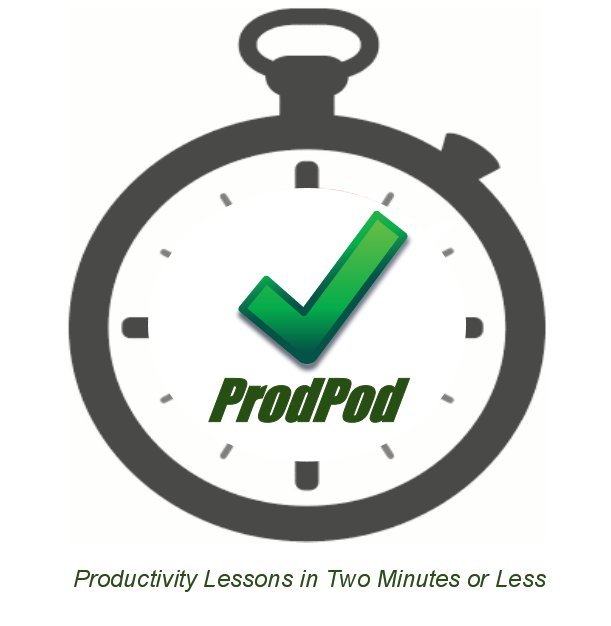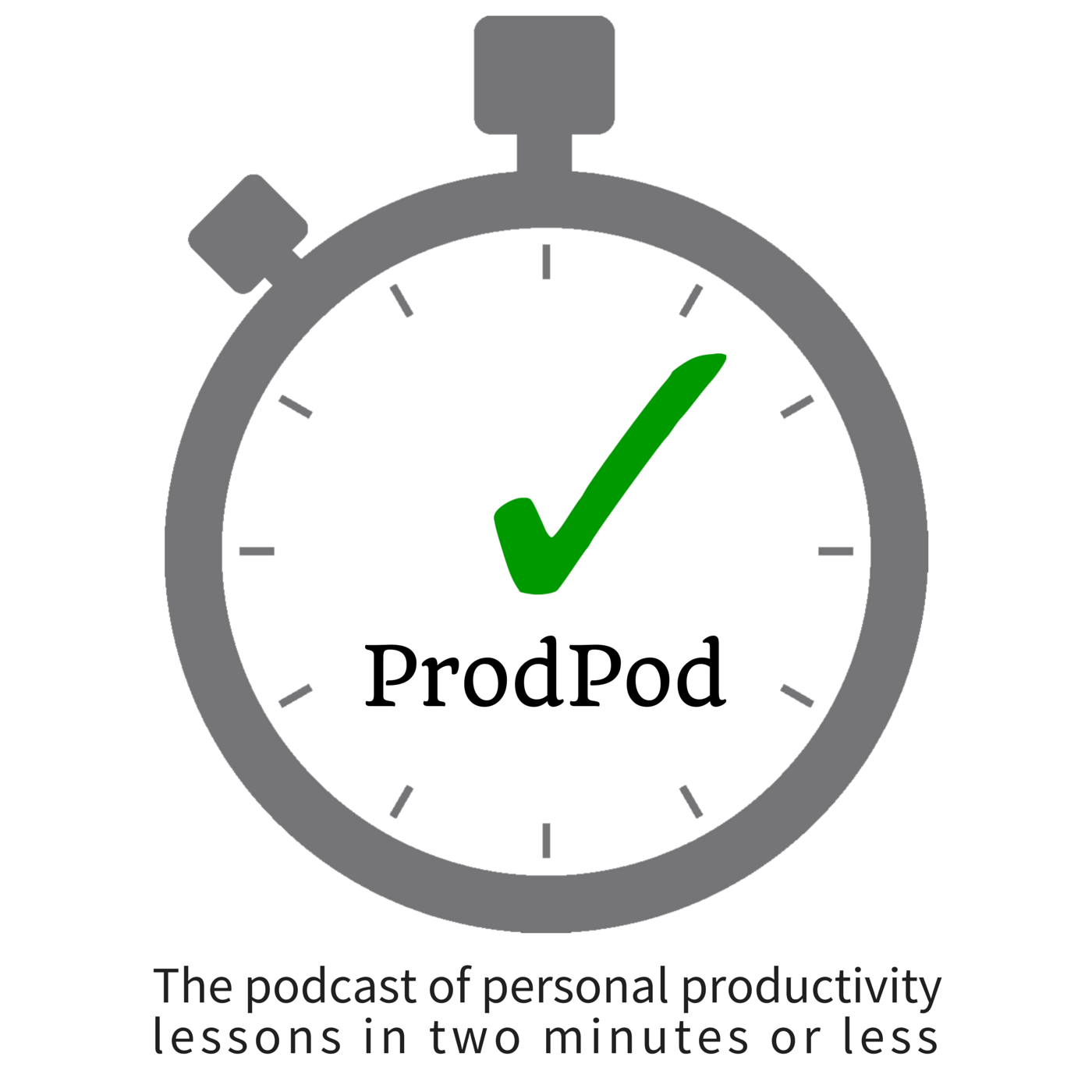Episodes

Thursday Sep 20, 2012
Thursday Sep 20, 2012
In our last episode, we discussed the first part of Hardcore Decluttering, recognizing physical clutter and determine its cost to you financially and emotionally. In this episode, we'll turn to two additional kinds of clutter for you to recognize and tackle.
That second type of clutter is that which resides in your mind. Start a bucket list in a single, good-old-fashioned paper notebook. This isn't a task or project list. It's a list of all your emotional memories as they come to mind, your current emotional state, anxieties as you feel them, and worries about the future. Ruminating is a clear symptom that you're in need of psychic decluttering. Writing it down with pen and paper (in my experience and observations of others) is the best way to counteract these unhealthy stores of emotional baggage.
Finally, there's no doubt that as our lives become ever more digital, there's bound to be more data on our computers, our mobile devices and the Web about us that we have to manage. I remember when everything I owned in digital data could be held on a single "Microfloppy"...which, for you Millenials and younger, those were 3.5" floppy diskettes that held a whopping 1.44MB! Those were the days. I'd carry that "Microfloppy" with me everywhere and I felt like I held my entire world in my pocket. Well, today, I carry a smartphone that holds literally 22,755.5 Microfloppies worth of data and there's countless more data on the Web about me.
That doesn't mean you can't find ways to get rid of massive amounts of dead-weight data and organize it so that it's no longer clutter, but meaningful data that you can protect and use effectively. The first step is admitting to yourself you have digital clutter!
I know this is just a primer on how to start hardcore decluttering but my hope is that it sparks action and you can come up with new, innovative ideas about how you're banishing clutter. I'll be covering clutter type specifically--physical, psychic and digital--in future episodes so stay tuned!

Tuesday Sep 11, 2012
Tuesday Sep 11, 2012
We all know that clutter is a part of life for many of us. Further, some clutter is natural and manageable. But, at some point the clutter is apparent and stymies your productivity. So, let's kick-start your decluttering process with learning where clutter lives and a few tips on your way to what I'm calling, Hardcore Decluttering, a regular series of podcasts here on ProdPod. The idea is to take two minutes to reduce your clutter for dramatically beneficial outcomes!
[image: Venn diagram of physical/psychic/digital-->center area: Hardcore Decluttering]
PHYSICAL
Let's start with the easiest clutter to identify, the physical stuff hanging around your home, office, carrying bags (such as a briefcases, shoulder bags or purses), and the car. One way to help you make headway on physical clutter is by calculating its worth (or, rather, its cost to your bank account annually). So, what's the monetary value of your stuff? Create a spreadsheet or just make a paper list and start tabulating the cost of storing it in your home, storage or elsewhere? Every cubic square foot has a cost per year that's being eaten up by clutter; measure it and add the space to your spreadsheet. Next, how much did you pay for all that stuff? What's its market value today? Find those out and add them to your data. Add this information to the reality that this clutter is depleting your emotional reservoir of good feelings. Ready to start selling and donating and trashing that stuff now? Great! So, head to Craigslist.org for your nearest locality, sign up to give stuff away on Freecycle.org and Google your nearest Salvation Army or Goodwill store to see what you have that they might be accepting.
That's only one of three clutter-prone areas of your productive life. We'll continue in the next episode with covering psychic and digital clutter, so stay tuned! I hope you enjoyed this episode of ProdPod, I'm Ray Sidney-Smith and thanks for listening. Here's to your productivity success...in two minutes or less!

Tuesday Jul 17, 2012
Tuesday Jul 17, 2012
This is the final episode in our four-part ProdPod series on outsourcing your personal tasks in life...this episode is on getting started with bartering your personal tasks.
To get started...
Grab a paper ledger journal from the local office supply store (or if you're tech savvy, create an Excel or Google Spreadsheet workbook). Each sheet is dedicated to one person. Discuss with your barter buddy (or buddies) the terms of your arrangement. Each task is worth one credit and you should both track the credits of yourself and the other, so you can make sure that you're responsibly handling any conflicts that may arise. Determine how the credits can be used and make note of them in your journal or spreadsheets. Some credits will have expiration dates, some bartering relationships will reset every month, quarter or year. And, in the initial phase, I'd make sure to start with a test period where you can renegotiate the bartering relationship with your barter buddy after the first few times for any reason if the arrangement is just not working for either of you, without hard feelings or false assumptions. Relationships are far more important than a few poorly-laundered t-shirts!
The best items to barter are routine items that each party does on a weekly or monthly basis so there's less management involved. But, I've found that with co-workers you can get around many management problems and organizational productivity shortcomings by creating a bartering market. There's no doubt this requires much more planning but it can pay off if executed properly and managed responsibly. I believe that bartering tasks and projects for greater productivity is an untapped resource we all have access to in our ever-increasingly hectic lives, and all you need to do is ask the people you know.

Tuesday Jul 10, 2012
Tuesday Jul 10, 2012
We discussed in the last episode about the idea of using virtual assistants, personal concierges and daily money managers to help get more done in life without you doing all of it. In this episode in our four-part ProdPod series on personal outsourcing, I will be explaining for you how to use an age-old concept of outsourcing tasks for greater productivity...for free, bartering.
You know what bartering [http://www.gettingmoneywise.com/2011/12/swap-share-and-land-bartering.html?m=1] is. You have an apple and I want to buy an apple. And, I have an orange and you want an orange. But, neither of us has any currency. So, we decide that instead of buying the fruits from each other or from a market, we'll just exchange your apple for my orange. It turns out that we can translate bartering vis-a-vis your productivity.
Think about everyone in your life: co-workers, spouses, children, other family members, friends, acquaintances, and more. Did you ever find that you like to do certain things in life and others in your life enjoy doing the things you find difficult, boring and time-consuming? Why not swap tasks for greater efficiencies? For example, do you hate grocery shopping but love doing laundry? Ask your friend who lives nearby if s/he would be willing to swap duties. Or, perhaps you have to send out holiday cards every year and you always struggle to get them out on time, and your mother is great at the task but needs some help every year wrapping all the grandchildren's presents and that happens to be something you enjoy doing. Why not barter the card-writing for the gift-wrapping? I'm giving very simple examples, but get creative. You'd be surprised what your support network doesn't want to do and would be willing to do for you not to have to do their own stuff. You will find the efficiencies remarkable when you realize how little work it is to do a bit extra work doing what you enjoy and not do the things you really don't want to or never get around to doing.
In the final episode in this series, I'll give you a quick-start guide on how to begin personal tasks bartering.

Tuesday Jul 03, 2012
ProdPod: Episode 39 -- Outsource Your Personal Tasks, Part II
Tuesday Jul 03, 2012
Tuesday Jul 03, 2012
In this second episode of a four-part ProdPod series on outsourcing personal tasks, I introduced the idea of hiring a virtual assistant, personal concierge and daily money manager. In this episode, I'll explain what each is and why you would need one.
In the last episode, I introduced the idea of hiring a virtual assistant, personal concierge and daily money manager. In this episode, I'll explain what each is and why you need one.
Virtual assistants are never physically present and the equivalent to having an executive assistant. Many small business owners use them for varying levels of administrative, marketing and management duties. While they are utilized by businesses and executives most often, there's no reason why you can't hire them to do the same tasks that you would otherwise need to do yourself when you have better things to do with your time. Do you need research done for a report you need to write? Have your virtual assistant research and organize it for you. Do you need to organize your music library on your computer at home? Use a secure service such as LogMeIn Free and have him/her log in to your computer to do it for you. In the Internet Age, there's very little that cannot be done with merely a cellphone, email and a Web browser.
On the other hand, personal concierges are usually hyper-local services and are good for checking in the on the fish while you're away on vacation, waiting for the cable guy to supervise the installation of your new service and equipment, or picking up the dry cleaning or groceries. For those of us with long work hours and without spouses (or both spouses work full-time), these routine errands can really be a bear and a personal concierge service can be mighty beneficial.
Do you find it tough to find the time to pay your bills regularly or have the discipline to save? Does your mother or father's aging limit their ability to do their financial management as well as they used to? Or, are they forgetting to pay utilities? Well, you may not need a financial planner or accountant for these simple, personal bookkeeping duties. This is where a daily money manager might just be what you need.
The opportunities abound when it comes to outsourcing in your personal life, and I know that not everyone has the money to pay for a virtual assistant in their life. So, in episode 40, I'll be talking about a different way to outsource your personal tasks that doesn't require hiring anyone. Stay tuned.
I hope you enjoyed this episode of ProdPod. I'm Ray Sidney-Smith and thanks for listening. Here's to your productivity success...in two minutes or less!

